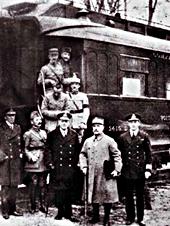Reflections on Remembrance Sunday
Peter Baker | 20:58, Saturday, 12 November 2011

After all, the colossal loss of life led many to believe that the Great War would be the war to end them all.
But sadly we didn't listen. Tragically history has kept repeating itself. So today we tend to remember not just those who died in that war but in all other conflicts since.
In my experience, these occasions go beyond remembering the generous sacrifice of armed forces. Our own mortality is captured by them, those we have loved and let go are recognised, the dashed hopes and shattered dreams we once entertained are recalled.
So the two minute silence is about more than the horrors of war and the ultimate price for freedom. This pause in a hectic world is a symbol of our spiritual need to be still; the formal silence, a prompt to the memory which helps us mourn our losses; and the poppy we wear, among other things, an acknowledgement of the limitations of human existence.
And there is more to us than remembrancers. We are creatures of hope who long to hear the music of the future. We understand that simply to recall the past is not necessarily to deal with it. Things need to change. The world is still not free of tyrants and despots, our lives are still broken. And we ache for the day when God’s new day will dawn.
So we reach out beyond our finite horizons to connect with the God whose everlasting Kingdom of justice and peace will come. We, whose days are like the momentary splendour of a flower, are invited to know the God who is the eternal home of all those who trust Him.
There's a museum on the island of Anglesey which contains something called the Memory Wall. I was there not long ago. Tourists and locals place hand written Post-it notes on the wall to reflect their memories of the island. One lady recalled how the same week every year she arranged to meet up for a holiday with the same person from a different part of the world. A trainee pilot wrote of the island bringing him into contact with the girl he eventually married.
I asked the curator of the gallery how long these particular messages would remain on the wall and he told me that they were taken down every month to be replaced by new memories.
God has a memory wall as we discover in Psalm 103:12-14. Reassuringly, He remembers our human limitations. But even more remarkably He removes our sins from the wall and forgets them.
How is it that God can remove our transgressions from his memory wall? Perhaps this may help to make sense of it.
In Arlington National Cemetery in Virginia, there's a gravestone with a simple inscription on it. "I want to stand where you are standing."
Underneath is the story of an incident that occurred in the American Civil War. A Yankee soldier, only 19 years of age, was part of a firing squad, assigned to execute a man for treason. As he closed one eye and took aim down the barrel of his gun, he was horrified to see that he knew the man he was about to shoot. He lowered his gun, walked over to his captain and said "I can't do it. That man has a wife and children at home. If I shoot him I not only end his life, but I end theirs too. I will make his wife a widow and I'll be robbing the children of a father. I can't do it."
So after a discussion they came up with a plan. The young soldier could take the condemned man's place. The 19 year old Yankee marched up to the Confederate captive and said simply, "I want to stand where you are standing." The captive took off his blindfold and walked away, back to his wife, his family, his life. But his freedom came at great cost to another: the young man who had willingly chosen to die in his place.
That’s how through the death of His Son on the cross, God deals with our sin. Jesus takes our place. He is our substitute.
So as we remember the fallen and with them our own mortality, we remember that in Christ, the self-giving God has remembered us but not our sin.
"May I never lose the wonder, the wonder of the cross. May I see it like the first time, standing as a sinner lost."
Document Actions

